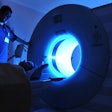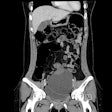A patient death following a COVID-19 vaccination was due to a combination of tragic unfortunate timing, system shortcomings, and human error – including by a reporting radiologist – a U.K. independent review has found.
Jack Last, 27, died from a blood clot after receiving the AstraZeneca (AZ) COVID-19 vaccine in 2021. The 126-page report into his death, which was commissioned by the Suffolk and North East Essex Integrated Care Board, was published on 17 September by Facere Melius, a specialist in reviews of serious incidents, patient safety training, and governance improvement.
After experiencing adverse side effects to the vaccine, the patient went to West Suffolk Hospital in Bury St Edmunds, the authors explained. His blood test results were abnormal, so the on-call consultant (hospital doctor) requested a CT venogram (CTV) to rule out cerebral venous sinus thrombosis (CVST) and to provide an accurate and detailed depiction of the cerebral venous system.
At the time, the hospital was unable to perform the CTV scan as the radiographer in attendance did not have the technical expertise to perform such a scan. The on-call consultant, referred to in the report as Dr. B, therefore advised that the patient should have a plain head CT scan, which was performed that evening.
Out-of-hours reporting on scans at West Suffolk Hospital is provided by 4Ways Healthcare, an imaging outsourcing company that provides remote reporting services for U.K. National Health Service (NHS) hospital groups and private healthcare organizations.
"The radiologist reported on the CT scan that evening, indicating that there were no acute abnormalities in Jack's brain," the investigators wrote. "This was later found to be inaccurate. As a CT venogram was not available, the plan was for it to take place in the morning. Jack was then transferred to a bed on the acute assessment unit."
The incorrect reporting of the CT scan was identified on the next morning of 10 April when Dr. B discussed the case with the on-call consultant radiologist, referred to in the report as Dr. C. The radiologist reviewed the overnight CT scan and identified a high-density thrombus.
According to Facere Melius, a subsequent review "demonstrated subtle abnormalities that could have identified a blood clot in the patient's brain. This was not identified in the report, and the patient was misreported as having no brain abnormalities. A CT venogram was performed the following day and clearly demonstrated a blood clot."
The investigation noted that the delay in treatment of about 15 hours is unlikely to have changed the patient's outcome, but an opportunity had been missed to start the correct medication regime earlier and/or to have transferred him immediately to a hospital that could have undertaken the CT venogram and provided the expert specialist treatment.
The patient should have been sent straight away to another hospital or center that could provide the CT venogram, rather than waiting until the next day, the authors noted. Vaccine-induced immune thrombotic thrombocytopenia (VITT) is such a serious condition that prompt diagnosis provided by the CT venogram would have been possible and treatment started more rapidly.
"However, given the pressure that acute trusts (hospital groups) were under at this time, it is unlikely that an inter-hospital transfer for imaging alone would have taken place any more rapidly than the scan that did take place at West Suffolk Hospital," they wrote.
The blood clot in the right venous drainage channel of Jack's brain was visible on the original CT head scan but was not reported by the radiologist from 4Ways. "This was another missed opportunity to start treating the blood clot straight away, but this would not have provided a definitive diagnosis of CVST."
An indication of probable CVST-VITT was not identified until the CTV was performed the following day, the report added. It also pointed out that Dr. B, the on-call consultant, had said at the patient's inquest (held on 12-13 December 2022) that he would have treated the patient for VITT that night if he had been given an accurate report from the CT scan.
The patient was eventually transferred to specialist care at Addenbrooke's Hospital in Cambridge, BBC News reported in a 17 September article about the investigation. His treatment there, the report said, was "appropriate and of a high standard," but Jack Last died on 20 April 2021. The 2022 inquest found he died from a blood clot as a direct result of his reaction to the vaccine.
"If Jack had not been invited to have the AZ vaccine early," the report said, "he would have been in a much later cohort (starting 8 June 2021), by which time people under 30 were to be offered Pfizer or Moderna vaccines."
Data from the U.K. Office for National Statistics shows that until July 2023, the deaths of 63 people in England "involved" the adverse effects of a COVID-19 vaccine, with 55 of those being "due" to the vaccine, the BBC stated.





















